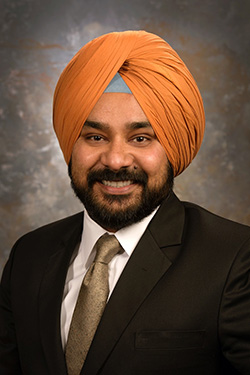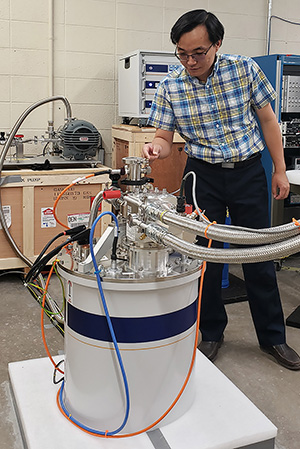Two UW Faculty Members Receive DOE Grants to Research Alloys, Quantum Computer Materials
Published July 22, 2020

Dilpuneet Singh Aidhy is studying high entropy alloys that are potential materials for large structural applications, while Jifa Tian is researching a solution to create materials and understand the fundamental physics for future quantum computers that can process problems classic computers cannot.
Both University of Wyoming faculty members’ research projects received a boost earlier this month. Their projects are two of 31 for which the U.S. Department of Energy (DOE) granted $21 million in total Established Program to Stimulate Competitive Research (EPSCoR) funding.
“These alloys are potential materials for large structural applications due to their vastly superior mechanical properties over conventional alloys,” says Aidhy, an assistant professor of mechanical engineering. “In particular, these alloys have shown potential to break away from the ductility versus strength trade-off.”
In conventional alloys, if the strength is increased, the ductility decreases. In these high entropy alloys, both can be increased simultaneously, he says.
“Our work will develop a fundamental understanding of atomic and electronic-level processes that lead to achieving high strength and high ductility in high entropy alloys,” Aidhy says. “In particular, we will elucidate the role of electronic charge density on twinning in high entropy alloys.”
Aidhy will collaborate with Ames Laboratory and use its complementing techniques to advance scientific understanding.
Aidhy’s grant is for $375,000 over three years. The grant will fund two graduate students and one undergraduate student, he says.
Tian, an assistant professor in the Department of Physics and Astronomy, says that, in classical computers, information is processed based on two resistance states called “0” and “1” states. However, a quantum computer uses quantum bits, or qubits, to encode information as “0, “1” or a coherent superposition of both. This enables quantum computers to process enormous combinations of states at the same time and in a much shorter timeframe.

“Majorana particle, the only particle that is its own antiparticle, is one of the most compelling quests in condensed matter physics because of its potential for creating qubits to build future quantum computers,” Tian explains. “In this project, we are looking to realize and manipulate such Majorana particles in a simple materials system, 2M tungsten disulfide (WS2), at the atomic scale. Here, 2M stands for a monoclinic structure with two layers per unit cell.”
The project is in collaboration with the following co-principal investigators: TeYu Chien, an associate professor of physics and astronomy; Jinke Tang, department head and professor from physics and astronomy; Brian Leonard, an associate professor of chemistry; and John Ackerman, an adjunct professor in chemical engineering.
Tian’s grant totals $750,000 over three years and includes funding for four graduate students and, potentially, some undergraduate students.
Tian says the research will help UW build strong partnerships with Argonne National Laboratory, Lawrence Berkeley National Laboratory and Sandia National Laboratories; and develop competitive capabilities in the field of topological superconductivity in condensed matters.
Under the DOE program, university researchers from EPSCoR states partner with researchers at DOE national laboratories on topics of common interest. Subjects include fundamental research in chemistry and materials science, advancing solar energy and battery technologies, studies in particle physics and other areas.
Funding totals approximately $21 million with fiscal year 2020 funding for DOE EPSCoR projects lasting up to three years in duration. Projects were chosen by competitive peer review under a DOE funding opportunity announcement for EPSCoR-state-national laboratory partnerships.
“The projects announced are collaborative DOE lab-academia efforts that will simultaneously advance science and technology, as well as strengthen America’s research infrastructure and capabilities,” says Paul Dabbar, the DOE’s undersecretary for science. “Both EPSCoR states and the national laboratories benefit strongly from these very productive, innovative research partnerships.”

